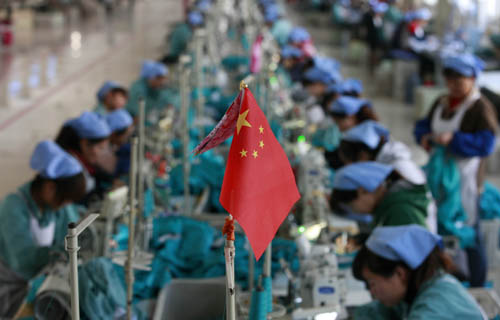|
 |
|
Workers complete export orders at a clothing factory in Huaibei, Anhui province. According to experts, China is losing its advantage in labor-intensive industries as production costs increase. [Photo/China Daily]? |
Sluggish demand, islands tensions, rising labor costs likely to hit orders
China may suffer an even worse environment for exports next year, in the wake of sluggish global demand, especially in the United States and Japan, said a senior economist with the State Council on Thursday.
"The situation for 2013 is not likely to be better than this year," said Long Guoqiang, director-general of the Research Department of Foreign Economic Relations of the Development Research Center under the State Council.
As the US will have large drags on its fiscal situation next year, the government is likely to cut spending while improving tax reform, which may lead to the continuation of low imports from China, according to Long.
"Sino-Japanese trade and investment may also see a gloomy outlook, affected by the Diaoyu Islands dispute," Long said.
But he predicted relatively stable growth in exports in the last three months of this year, similar to September's 9.9 percent year-on-year growth.
A research note from UBS AG predicted that exports in October are likely to grow by almost 9 percent from a year earlier.
The National Bureau of Statistics released the Purchase Management Index for manufacturers on Thursday, which indicated an improvement in new export orders in October, up to 49.3 from September's 48.8, but is still showing a contraction.
Some industries, including furniture, automobiles and electronic equipment, saw an expansion in October, according to the statistics.
"Despite the less sharp contraction of orders, exporters still face strong headwinds in the coming months," said Sun Junwei, an economist with HSBC Holdings.
Sun said that the sharp rebound in China's export growth from a rate of about 2 percent between July and August to 9.9 percent in September "will unlikely be sustained".
A survey of exporters at the Canton Fair in October showed that only 20 percent of them saw an increase in orders, according to HSBC.
As production costs increase in China, the country is losing part of the advantage in labor-intensive industries, which has contributed the most to the "miracle" growth rate during the past decade, Long said.
"The country's exports will see new opportunities in the next 10 years, with advantages from the enlarging industrial scale, which can help accelerate the product upgrade and accelerate high technology imports," he said.
Long suggested seizing chances during the urbanization process in emerging economies and exporting high technology value-added products to maintain domestic growth.
